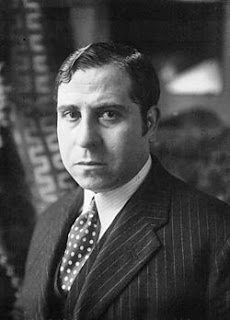Las palabras búmeran, de ida y vuelta - Boomerang words, a round trip
(English version below)
Las palabras búmeran, de ida y vuelta
En el mundo de los idiomas los préstamos lingüísticos ocurren con frecuencia como resultado de la interacción entre distintas culturas y sus lenguas. Un préstamo es aquella palabra que tomamos "prestada" de una lengua extranjera para describir algo para lo cual - en teoría - no teníamos una palabra equivalente en nuestra propia lengua. Así, podemos encontrar en el español muchos préstamos de origen inglés (anglicismos) sobre todo en el ámbito de la tecnología como "escanear", "chatear" o "monitor" y del mismo modo podemos citar préstamos franceses (galicismos) en el ámbito de la cocina como "chef", "crepa" y "gourmet".
Pero en ocasiones el viaje de estas palabras es de ida y vuelta, y así podemos encontrarnos tomando prestada de otra lengua alguna palabra que originalmente era de nuestra propia lengua, pero que sufrió algunos cambios ya sea en la forma o el significado. Son palabras búmeran, préstamos de ida y vuelta, que se van de viaje y regresan con un acento extranjero, y a continuación revisaremos 12 ejemplos interesantes:
1. ALCOHOL (viaje redondo árabe-español-árabe): La palabra "alcohol" proviene del árabe al-kuhl,"kohl", un cosmético hecho a base de galena molida usado principalmente como máscara de ojos. Lo curioso es que esta palabra pasó como "alcohol" al español, en un principio designando cualquier polvo fino y después el compuesto que caracteriza a las bebidas alcohólicas; y con ese significado pasó a muchas otras lenguas como el inglés y, sí, el árabe, a donde regresó como kuhul.

2. ANIME (viaje redondo inglés-japonés-inglés) El inglés tomó la palabra "anime" del japonés con el sentido de "animación japonesa". La palabra "anime" es una abreviatura de "animeshon", a su vez tomada del inglés animation.
* Bonus: COSPLAY: A partir del inglés costume play se formó esta abreviatura en japonés, que ahora se usa en todo el mundo para referir a la práctica de vestirse como un personaje de ficción, por ejemplo en las convenciones de cómics.
3. BARBECUE (viaje redondo español-inglés-español): En inglés formaron la palabra barbecue a partir de la palabra española "barbacoa", que a su vez proviene del taíno barbakoa, que designaba a una estructura de palos de madera con la que los nativos curaban la carne. En México le llamamos barbacoa a un estilo particular para preparar diversas carnes, que no tiene nada que ver con la salsa barbecue, tradicional de las parrilladas gringas.

4. BERGAMOTA (viaje redondo turco-italiano-turco): Esta fruta cítrica de forma similar a una pera, fue nombrada en italiano bergamotto, a partir del turco beg armudu, "la pera del señor". La palabra pasó a varios idiomas europeos, y del francés regresó finalmente al turco como bergamot.
5. CÁTSUP / KÉTCHUP (viaje redondo chino-inglés-chino): En el siglo XVII, los chinos inventaron una salsa hecha con pescado en vinagre y la llamaron 鮭汁 ke-chiap, (salmuera de pescado). La salsa llegó hasta Malasia y Vietnam, donde fue probada por los colonizadores ingleses en el siglo XVIII. La salsa sufrió varias modificaciones en las cocinas británicas. En un principio era común prepararla con hongos, pero fue la versión con tomates la que alcanzó mayor éxito y terminó por reemplazar a las demás versiones. Al igual que la salsa, la palabra también evolucionó en inglés, fue nombrada catsup, nombre que es aún el más común en México, o ketchup, que es el nombre más común en el resto del mundo, incluyendo China, donde regresó para nombrar una salsa que después de todo, ya no tenía nada que ver con la receta original.
6. CINE (viaje redondo griego-francés-griego): La palabra "cinematografía" fue acuñada en francés como cinématographie por los hermanos Lumière en 1890, a partir de las voces griegas κίνημα (kínēma, “movimiento”) y γράφειν (-gráphein,
"grabación"). La versión abreviada cinéma regresaría al griego como σινεμά (sinēma).
7. GALA (viaje redondo francés-español-francés): Si buscas "gala" en el diccionario en español, encontrarás que proviene del francés. Si buscas gala en francés, encontrarás que proviene del español. La palabra proviene originalmente del francés antiguo gale (regocijo, fiesta) que en español se convirtió en gala, y así regresó al francés y a otros idiomas, con el significado de vestido sobresaliente, y posteriormente, evento en donde se lucen dichos vestidos o "trajes de gala". De ahí también provienen las palabras "galán" y "galantería".

8. KAMIKAZE (viaje redondo japonés-inglés-japonés): El término japonés kamikaze, que significa "viento divino", comenzó a ser utilizado por estadounidenses en la Segunda Guerra Mundial para referirse a los ataques suicidas contra los Aliados por parte de los pilotos de la Armada Imperial Japonesa "Unidades de Ataque Especial Viento Divino". El origen de este término se encuentra en el siglo XIII, cuando un tifón arrasó una flota de Mongolia que intentaba invadir Japón, y por ello fue nombrado un "viento divino". El término se extendió por todo el mundo para referirse a cualquier ataque suicida y finalmente regresó a Japón con este mismo significado.
9. PELUCA (viaje redondo español-francés-español) La etimología de esta palabra es como un bucle infinito. En español, primero la tomamos del francés perruque y la "rr" se convirtió en "l" por influencia de la palabra "pelo". En francés perruque sería un derivado regresivo de perroquet, "loro", que era un apodo popular para los miembros del jurado en Francia, célebres por su peculiar verborrea al exhibir sus argumentos, y sí, por sus vistosas y enormes pelucas. Curiosamente, la palabra perroquet sería a su vez una deformación del español "periquito", - diminutivo del nombre antiguo Pero, hoy Pedro - aunque otros la hacen derivar del italiano parrocchetto, "pequeño párroco". Quizás también los párrocos tenían fama de pericos con sus sermones.

10. POPURRÍ (viaje redondo español-francés-español): Del francés pot purri, a su vez un calco del español "olla podrida", un guiso popular o "puchero" de la Edad Media que incluía una gran variedad de ingredientes. La traducción francesa pasó a referirse a cualquier colección de muchas cosas y finalmente, en música, a la unión de varias piezas musicales en una sola interpretación larga.
11. TENIS (viaje redondo francés-inglés-francés): Del francés tenez (tenga, tengan) imperativo de tenir (tener). Era muy frecuente oír esta expresión - algo así como "¡ten!" o "¡toma!" - en el jeu de paume (juego de palma), antecedente del juego de tenis. Tenez pasó como tennis al inglés, y posteriormente regresó de esa forma al propio francés. Cabe añadir que la palabra tennis también comenzó a referirse - en inglés y luego en español - al calzado deportivo que se usaba en este deporte, y posteriormente a todos los calzados deportivos en general. Curiosamente a este calzado se le llama basket en francés, por otro deporte, el basketball.
12. TORNADO (viaje redondo español-inglés-español): Una palabra tan transparentemente española, pero que fue formada sin embargo en la lengua inglesa, donde reinterpretaron la palabra "tronada" (tormenta de truenos) como "tornado" por influencia del verbo "tornar" (girar). Y del inglés regresó al español con el significado de violento torbellino de aire que gira sobre sí mismo.
Y en caso de que se lo estuvieran preguntando... no, búmeran no es una palabra búmeran - otro desperdicio como el hecho de que la palabra hiato no tenga ningún hiato - Viene de bumariny, de la lengua australiana darug, que también nos dio "walabí" y "koala". :-)
Ferdinandus
***
Boomerang words, a round trip
In the world of languages, loanwords often occur as a result of the interaction between different cultures and their languages. A loanword is a word borrowed from a foreign language to describe something for which we - in theory - didn't have an equivalent word in our own language. Thus, we can find in Spanish many loans of English origin (anglicisms) especially in the field of technology such as escanear, chatear or monitor - from scan, chat, monitor - and likewise we can cite French loanwords borrowed from French (gallicisms) in the field of cooking as "chef", "crepe" and "gourmet".
But sometimes the trip of these words is round, and thus we may find ourselves borrowing from another language a word that was originally from our own language, but which underwent some changes in either form or meaning. They are boomerang words, reborrowings that go on a trip and return with a foreign accent, and below we'll review 12 interesting examples:
1. ALCOHOL (round trip Arabic-Spanish-Arabic): The word "alcohol" comes from the Arabic al-kuhl, "kohl", a cosmetic made from galena powder, mainly used as an eye mask. The funny thing is that this word came to Spanish as "alcohol" initially designating any fine powder and then the compound that characterizes alcoholic beverages; and with that meaning the word traveled to many other languages like English and, yes, Arabic, where it returned as kuhul.

2. ANIME (round trip English-Japanese-English): English borrowed the word "anime" from Japanese with the sense of "Japanese animation". The word "anime" is an abbreviation for "animeshon", in turn borrowed from the English word "animation".
* Bonus: COSPLAY: From English costume play, this abbreviation was formed in Japanese and now it's used around the world to refer to the practice of dressing as a fictional character, for example in comic conventions.
3. BARBECUE (round trip Spanish-English-Spanish): The word came to English from the Spanish barbacoa, in turn from Taino barbakoa, which designated a structure of wooden sticks with which the natives healed the meat. In Mexico we call barbacoa a particular cooking method to prepare different meats, and we distinguish that from the sauce, which we call by its English name, barbecue.

4. BERGAMOT (round trip Turkish-Italian-Turkish): This pear-like citrus fruit was named bergamotto in Italian, from the Turkish beg armudu, "the pear of the lord". The word traveled to several European languages, and through French finally returned to Turk as bergamot.
5. CATSUP / KETCHUP (round trip Chinese-English-Chinese): In the 17th century, the Chinese invented a sauce made with pickled fish and called it 鮭 汁 ke-chiap, (fish brine). The sauce came to Malaysia and Vietnam, where it was tested by English settlers in the 18th century. The sauce underwent several modifications in the British kitchens. At first it was common to prepare it with mushrooms, but it was the version with tomatoes that reached greater success and ended up replacing the other versions. Just like the sauce, the word also evolved in English, it was named catsup, a name that is still the most common in Mexico, or ketchup, which is the most common name in the rest of the world, including China, where it came back to name a sauce that, after all, had nothing to do with the original recipe.

6. CINEMA (round trip Greek-French-Greek): The word "cinematography" was coined in French as cinématographie by the Lumière brothers in 1890, from the Greek voices κίνημα (kínēma, "movement") and γράφειν (-graphein, "recording"). The abbreviated version cinéma would return to the Greek like σινεμά (sinēma).
7. GALA (round trip French-Spanish-French): If you look for "gala" in a Spanish dictionary, you will find that it comes from French. If you look for gala in French, you will find that it comes from Spanish. The word comes originally from the old French gale (gaiety, festivity) which in Spanish became gala, and it returned like that to French and other languages, meaning an outstanding dress or suit, and later, the event where people use them. From gala came also the words "gallant" and "gallantry"

8. KAMIKAZE (round trip Japanese-English-Japanese): The Japanese term kamikaze, meaning "divine wind," began to be used by Americans in World War II to refer to the suicide attacks on the Allies by Japanese Imperial Navy pilots from the Special Attack Units "Divine Wind". The origin of this term is in the 13th century, when a typhoon destroyed a fleet of Mongolia that tried to invade Japan, and for that reason it was named a "divine wind". The term spread throughout the world to refer to any suicide attack and finally returned to Japan with this same meaning.
9. WIG (roundtrip Spanish-French-Spanish): The etymology of this word is like an infinite loop. The word came initially to English as periwig, from the French perruque. In Spanish, that word became peluca, the "rr" becoming "l" by influence of the word pelo (hair in Spanish). In French perruque would be a regressive derivative of perroquet, "parrot", which was a popular nickname for members of the jury in France, famous for their peculiar verbiage when displaying their arguments, and yes, for their huge and showy wigs. Curiously, the word perroquet would be in turn a deformation of the Spanish periquito, "little parrot" and a diminutive of the old name Pero (Peter, now Pedro in Spanish) though others make it derive of the Italian parrochetto, "little priest". Perhaps the priests were also known as parrots because of their preaches.

10. POTPURRI (round trip Spanish-French-Spanish): From the French pot purri, in turn a calque of the Spanish olla podrida, "rotten pot", a popular stew from the Middle Ages that included a great variety of ingredients. The French translation ended up refering to any collection of different things and finally, in music, to the union of several musical pieces in a single long interpretation.
11. TENNIS (round trip French-English-French): From the French tenez, imperative of the verb tenir (to have). It was very common to hear this expression - something like "hold!" or "take!" - in the jeu de paume (game of palm), precursor of the game of tennis. Tenez became tennis in English, and then returned to French like that. It should be added that the word "tennis" also began to refer - in English and then in Spanish - to the shoes worn in this sport, and subsequently to all sports shoes in general. Curiously, this shoe is called basket in French, for another sport, basketball.

12. TORNADO (round trip Spanish-English-Spanish): A word so transparently Spanish, but nevertheless formed in the English language, where they reinterpreted the word tronada (thunder storm) as tornado by influence of the verb tornar, "to turn". And in Spanish the word was reborrowed with the meaning of violent whirlwind of air that turns on itself.
And in case you were wondering ... no, boomerang is not a boomerang word - another waste, such as the fact that the word hiatus in Spanish (hiato) has no hiatus as in English does. It comes from bumariny, from the Australian language Dharug, which also gave us "walabi" and "koala". :-)
Ferdinandus




















Comentarios
Publicar un comentario